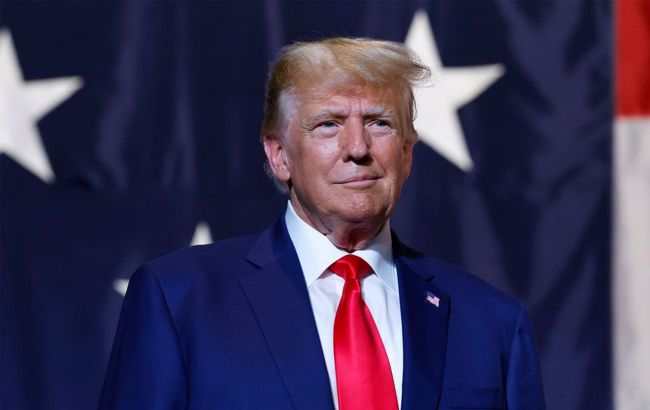US judge sets Trump's sentencing in hush money case
 Photo: US President-elect Donald Trump (Getty Images)
Photo: US President-elect Donald Trump (Getty Images)
The New York State Supreme Court is set to announce a verdict on January 10 regarding elected US President Donald Trump in the case involving a payment made to adult film star Stormy Daniels in exchange for her silence. However, it is unlikely that the politician will be sent to prison, reports Reuters.
Acting Justice of the New York State Supreme Court Juan Merchan ruled that Trump will be required to appear at a court hearing 10 days before his inauguration on January 20. This marks an unprecedented event in US history. No former or sitting president has ever been charged with a crime or convicted.
The judge stated that Trump could be present for the sentencing either in person or virtually. He also added that a verdict of "unconditional discharge," meaning no detention, fine, or probation, would be "the most viable solution."
Motions to dismiss the case rejected
Merchan announced his sentencing plan after rejecting Trump's motion to dismiss the case following his victory in the presidential election.
In a second motion to dismiss, filed after Trump's May conviction, his lawyers argued that the case, looming over him during his presidency, would hinder his ability to govern the country.
Merchan dismissed this argument, stating that overturning the jury's verdict would "undermine the Rule of Law in immeasurable ways."
"Defendant's status as President-elect does not require the drastic and 'rare' application of (the court's) authority to grant the (dismissal) motion," Merchan wrote in his ruling.
The judge also dismissed Trump's December 3 argument that dismissal was justified due to his "civic and financial contributions to this city and the Nation are too numerous to count."
While recognizing the politician's achievements as president, the judge noted that Trump's public statements undermining the judicial system were also factors in his decision.
Merchan criticized what he called Trump's "unrelenting and unsubstantiated attacks" on the integrity of the criminal proceeding. He reminded that Trump had been found guilty of 10 counts of contempt of court for repeatedly violating an order restricting out-of-court statements about witnesses and others.
"Defendant has gone to great lengths to broadcast on social media and other forums his lack of respect for judges, juries, grand juries, and the justice system as a whole. The defendant's character and history vis-a-vis the rule of law and the Third Branch of government must be analyzed. In that vein, it does not weigh in his favor," Merchan wrote.
Meanwhile, Trump's press secretary, Steven Cheung, stated that no verdict should be issued in this case.
"This lawless case should have never been brought, and the Constitution demands that it be immediately dismissed," Cheung said.
Extreme remedy
The sentencing was initially scheduled for November 26, but Merchan postponed it indefinitely after Trump's victory in the US presidential election on November 5.
In the Manhattan District Attorney’s office, Alvin Bragg’s team stated that other measures, apart from "the extreme remedy," were available. These included dismissing the jury's verdict, which could alleviate Trump's concerns about the distraction of a criminal case during his presidency.
They suggested several options to Merchan, including delaying the verdict until Trump, 78, leaves the White House in 2029 or ensuring a sentence that would not involve prison time.
Prosecutors also did not rule out the possibility that the judge might simply dismiss the case. They pointed out that Trump has never been convicted and that his verdict has neither been confirmed nor overturned on appeal. According to them, this approach is used in cases where the defendant dies after a conviction but before sentencing.
The case against Trump over the porn star’s silence
Prosecutors are investigating the $130,000 payment made by Trump’s former lawyer, Michael Cohen, to adult film actress Stormy Daniels. The payment was for her silence before the 2016 election regarding an alleged sexual encounter with Trump ten years earlier. Trump denies the affair, claiming the payment was legal and not related to his election campaign.
On May 30, 2024, a Manhattan jury found Trump guilty of 34 counts of falsifying business records to conceal the payment. This marked the first time a US president was convicted or charged with a criminal offense.
Trump has pleaded not guilty, calling the case an attempt by Manhattan District Attorney Alvin Bragg, a Democratic prosecutor who filed the charges, to harm his 2024 campaign.
On December 16, Trump lost a separate attempt to overturn the conviction following a US Supreme Court ruling on July 1. The ruling stated that presidents cannot be prosecuted for their official actions. It also determined that evidence of their official conduct cannot be presented in criminal cases related to personal behavior.
In rejecting Trump’s motion to dismiss the case, Merchan stated that criminal prosecution for "decidedly personal acts of falsifying business records" does not pose a threat. It does not interfere with the executive branch’s powers and functions.
Falsifying business records is punishable by up to four years in prison, though imprisonment is not mandatory.
Before Trump’s election victory, legal experts had stated that it was unlikely he would face prison time due to his lack of criminal history and his advancing age.

